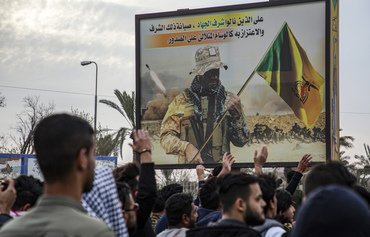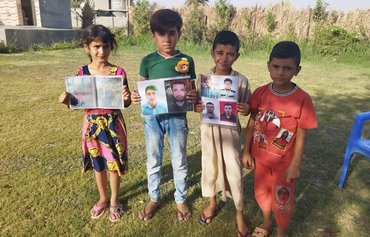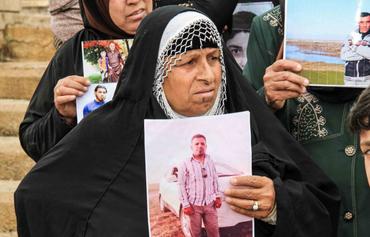After years of Iraqi government inaction on the issue of the "forcibly disappeared", the new government under prime minister Mustafa Kadhemi has announced it will investigate the fate of thousands who were abducted since 2015.
The whereabouts of thousands of Iraqis who were forcibly disappeared during battles to liberate the country from the "Islamic State of Iraq and Syria" (ISIS) remain unknown and their families are seeking answers.
Kadhemi on May 17th gave orders to expedite the investigation into the fate of these individuals during a meeting he held with Ministry of Interior officials.
Iranian-backed armed factions of the Popular Mobilisation Forces (PMF) have been accused of abducting civilians from liberated provinces and holding them in secret locations.
Former Iraqi MP Taha al-Lahibi said "thousands of civilians were abducted at the hands of Iran's militias, notably Kataib Hizbullah, which alone breached al-Razaza [security] checkpoint in Anbar province and abducted nearly 2,000 civilians and took them to secret prisons and detention centres in the town of Jurf al-Sakhr".
"These abductees had fled ISIS during the liberation battles in 2016 and 2017 only to fall into the hands of pro-Iran militias," he told Diyaruna.
Need for investigations
Comprehensive investigations need to be conducted to learn about the fate of the abductees, he said, stressing the need to form independent fact-finding committees that are free of militia influence.
Iraqi MP Karim Aftan al-Jumaili said Kadhemi's call for investigation is "a source of optimism".
"For the first time since the end of the war on ISIS, it has been clearly announced that this issue would be addressed," he told Diyaruna.
"This indicates there is an honest intention on the part of the new government to find the [forcibly disappeared] and end the suffering of their families," he said.
Parliament had already presented a list of the names of the abductees and their last known location to the previous government, he said. "We had been waiting for the investigations into their whereabouts to commence, but to no avail."
"We now have high hopes as the current PM was the head of the intelligence agency and is a security man so he will prioritise this issue," al-Jumaili added.
"We will support any professional investigations that lead us to the truth," he stressed.
More than 1,200 individuals were abducted from the towns of al-Saqlawiyah and al-Sajar in Anbar province, and a large number from Bzeibiz, Jurf al-Sakhr, Yathrib and Mosul.
The discovery of mass graves late last year heightened fears that many of the missing have already been killed by armed groups outside the law.
Last December, four mass graves that contained remains of dozens of people in civilian clothing were found in eastern Fallujah, close to where some of the abductees were last seen.
"At the time, we requested that samples be taken [to conduct DNA testing] and identify the bodies but have yet to obtain any results," al-Jumaili said.
International co-operation
The issue of the "forcibly disappeared" is a piece of a larger puzzle of missing persons, as Iraq's Independent High Commission for Human Rights currently has "8,000 complaints" from families whose loved ones have gone missing, commission spokesman Ali al-Bayati told Diyaruna.
In order to make progress in this issue as a whole, "intensive institutional work" has to be done that aims at "creating a central and comprehensive database of all prisoners and detainees", he said.
More also needs to be done "to resolve the issue of mass graves and know the fate of those who are missing", he said.
He called for "co-ordinating efforts with international agencies and Interpol to reveal the fate of those registered as missing, who were taken by ISIS and transported to unknown locations outside the country or who joined ISIS and fled to another country".

![Iraqi Prime Minister Mustafa Kadhemi held a meeting May 17th with several officials from the Ministry of Interior in which he requested a swift investigation into the fate of those who have gone missing during the war on ISIS. [Photo courtesy of the Prime Ministers media office]](/cnmi_di/images/2020/06/04/24289-kazimi-pm-iraq-600_384.jpg)






